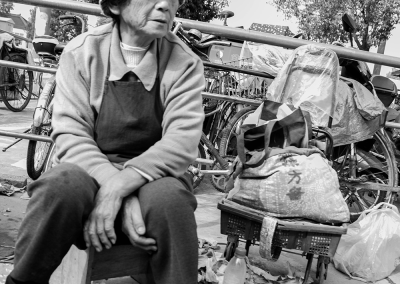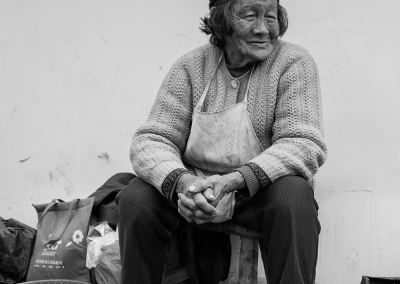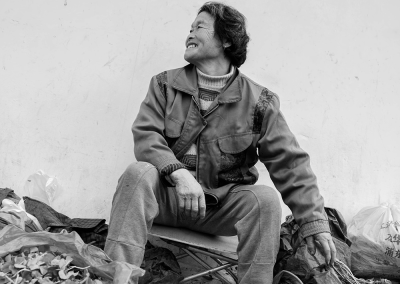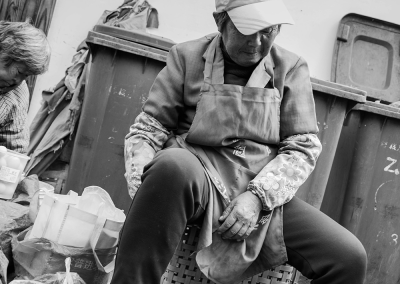In the bustling streets of cities and small towns across China, it’s not unusual to come across elderly men and women sitting quietly by the roadside, baskets of fresh vegetables neatly arranged before them. These humble stalls—often no more than a wooden crate or a woven basket—tell stories far deeper than the produce they display.
A Scene of Simplicity
The image is striking: wrinkled hands weighing leafy greens on an old scale, voices softened with age calling out prices, the rhythm of traffic and footsteps all around. Some of these elders rise before dawn, harvesting vegetables from their small plots of land in the countryside. Others buy produce in bulk from markets and resell them at a small markup, hoping to earn enough for daily expenses.
Their presence is more than an economic necessity; it is a reflection of a way of life. For many older people in China, retirement savings or pensions are insufficient. Selling vegetables becomes a way to supplement income, maintain independence, and stay active in a society that is changing rapidly.
Beyond Survival—A Sense of Purpose
To the passerby, the exchange may seem ordinary: a handful of bok choy, a few cucumbers, a small bag of garlic. But for the elderly vendor, each sale is a gesture of self-reliance. These small transactions bring not only money, but also dignity.
Selling vegetables keeps them connected to their communities. Neighbors stop to chat, bargain, or simply offer a smile. For many elders, these brief moments of social interaction help ease loneliness, which can weigh heavily as children move away to big cities or abroad for work.
The Struggles Behind the Stalls
Yet, life on the street is not easy. Vendors may spend long hours exposed to the hot summer sun or the biting cold of winter. Their profits are slim, sometimes just a few yuan a day. Some face challenges from city management officials who view unlicensed street vending as disorderly.
Still, despite the hardships, they return day after day, sitting on small stools, their produce carefully laid out as if to remind the world of their perseverance.
A Reflection of Tradition and Change
These scenes are not just about economics—they are snapshots of cultural transition. In older generations, working the land and selling goods in open markets was the backbone of life. Today, as skyscrapers rise and supermarkets expand, elderly street vendors stand as living bridges between China’s agrarian past and its modern, urbanized present.
They remind us that resilience is not always loud. Sometimes, it is found in a quiet figure on the roadside, guarding a basket of vegetables, holding onto independence with wrinkled hands and an unyielding spirit.
A Moment to Pause
Next time you walk by such a vendor—whether in China or anywhere in the world—pause for a moment. Behind those humble stalls lies a story of survival, of dignity, and of unwavering determination. Buying a small bundle of greens may mean little to you, but it could mean a day’s worth of rice, medicine, or hope for them.
Latest Posts
Taking the Back Country Roads to Burlington, Ontario
There’s something special about leaving the highway behind and letting the road unwind at its own pace. When you take the backcountry roads to…
Sheeps at Bronte Creek Provincial Park: A Gentle Glimpse into Farm Life
Tucked away in the heart of Oakville, Bronte Creek Provincial Park is more than just a place for hiking trails and picnics—it’s also home to a…
Check out my shop
If you would like to support me by purchasing my work, then feel free to browse my shop. You can buy most of my work in either digital download or canvas.
Other posts you may like
Taking the Back Country Roads to Burlington, Ontario
There’s something special about leaving the highway behind and letting the road unwind at its own pace. When you take…
Sheeps at Bronte Creek Provincial Park: A Gentle Glimpse into Farm Life
Tucked away in the heart of Oakville, Bronte Creek Provincial Park is more than just a place for hiking trails and…
Adventures at Crane Park – Guelph
I remember going on adventures at Crane Park as a kid, but back then, it didn’t have a name; it was just a place where…









